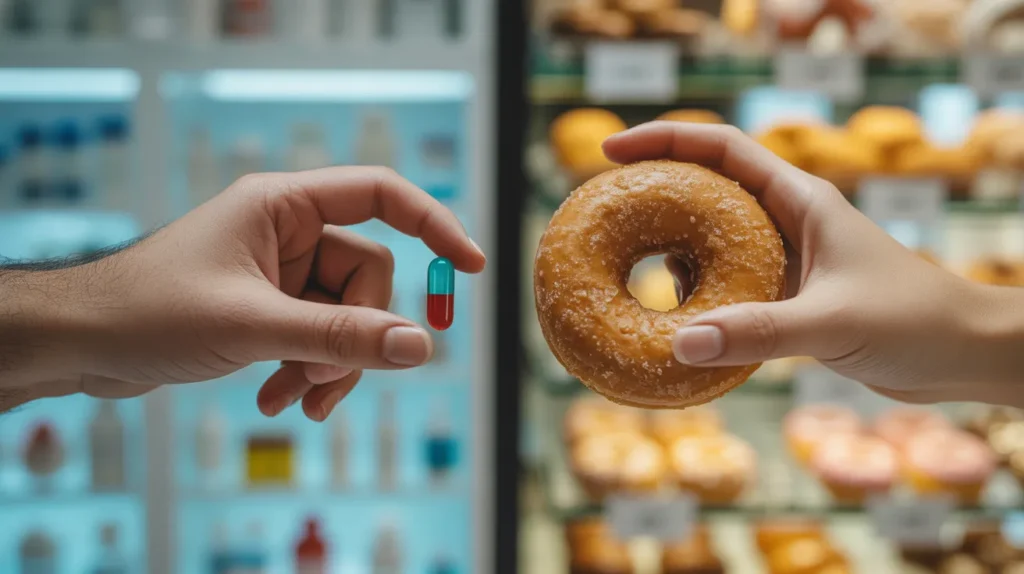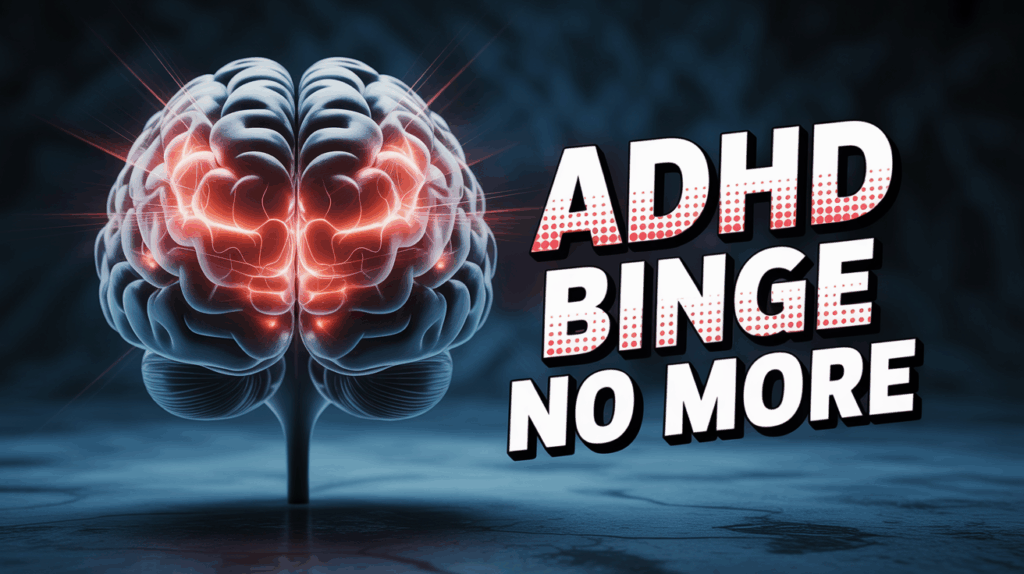ADHD and Binge Eating
Understanding the Link Between ADHD and Binge Eating
ADHD and binge eating are closely connected through impulsivity, mood changes, and disrupted appetite signals. Research shows a strong correlation between ADHD and compulsive eating, with prevalence higher than in the general population. Patients often report that boredom, hyperfocus, or emotional eating drive their behavior.

Neuroscience studies highlight how the brain’s reward system may be overstimulated, leading to overeating ADHD experiences. Hunger cues become less reliable, while eating provides immediate stimulation and pleasure. This makes ADHD and overeating more than a simple habit; it becomes a mental health concern with physical health consequences.
Prevalence and Statistics
Statistics indicate that adults with ADHD have higher rates of eating disorders compared to peers without the condition. ADHD and eating disorders, including binge eating, appear as common comorbidity in clinical trial data. Studies reviewed in the Diagnostic and Statistical Manual of Mental Disorders support the link between ADHD and compulsive eating, with ADHD eating disorder cases frequently co-occurring with mood disorders or substance addiction.
ADHD, Impulsivity, and Eating Behavior
Impulsivity is a hallmark of ADHD and directly influences eating behavior. When attention drifts, patients often turn to frequent snacking or overeating. This lack of control can result in shame, guilt, or disgust after a binge episode.
Executive Dysfunction and Meals
Executive dysfunction makes it harder to plan meals, regulate appetite, or manage diet structure. Adults with ADHD often skip structured meals and later engage in compulsive eating ADHD cycles. Hyperfocus on activities can also cause skipped meals, followed by excessive hunger that fuels binge eating.
Emotional Eating, Mood, and Stimulation
Emotional eating is another factor linking ADHD and binge eating. Patients often eat in response to stress, boredom, or low mood. Eating provides temporary pleasure and stimulation that quiets racing thoughts.
Shame, Guilt, and the Emotional Cycle
After episodes of overeating ADHD patients frequently feel guilt and shame. This emotional burden reinforces cycles of compulsive eating ADHD behaviors. Over time, the frequency of these cycles can affect both mental health and physical health outcomes, such as weight gain and type 2 diabetes.

Medication, Pharmacology, and ADHD Eating Disorder
Medication plays a complex role in ADHD and binge eating. Stimulant drugs such as methylphenidate or lisdexamfetamine affect appetite and motivation. While some patients notice reduced hunger, others experience rebound overeating as the drug wears off.
Clinical Trials and Treatment Options
Clinical trial data suggest lisdexamfetamine may reduce binge eating symptoms in adults with ADHD. Its effect on appetite, stimulation, and the brain’s reward system shows promise. However, not all patients respond the same, and medicine must be paired with therapy and education for long-term management.
ADHD Misdiagnosis and Eating Disorders
ADHD misdiagnosis is common, and many patients are first treated only for mood or eating disorders without their ADHD being recognized. This can delay proper treatment, leaving the root causes of impulsivity and compulsive eating unaddressed. In some cases, adults report years of treatment for binge eating before an accurate ADHD diagnosis is made.
When ADHD is misdiagnosed, patients may struggle with ineffective medication or therapy plans. Recognizing the correlation between ADHD and overeating is essential for clinicians. Accurate diagnosis allows for better use of medicine, therapy, and coping strategies, reducing the cycle of emotional eating, shame, and guilt.
Neuroscience and the Reward System
Neuroimaging research reveals differences in the reward system of patients with ADHD and compulsive eating. Food provides heightened stimulation, which reinforces binge behavior. This neurological affect may explain why compulsive eating ADHD behaviors are resistant to simple willpower or diet changes.
Correlation Between Addiction and Overeating
The brain circuits involved in ADHD eating disorder cases overlap with addiction pathways. Pleasure from eating activates the same dopamine systems triggered by drugs. Patients describe binge eating as an addiction-like experience, reinforcing the need for clinical treatment.

Therapy and Coping Strategies
Therapy helps patients build coping skills for ADHD and binge eating. Cognitive-behavioral therapy (CBT) addresses impulsivity, emotional eating, and shame cycles. Dialectical behavior therapy (DBT) can also support emotional regulation and distress tolerance.
Support from Health Care Providers
A clinician or dietitian can guide patients with ADHD compulsive eating patterns. Education about nutrition and structured meal planning improves appetite control. A health care team may include therapists, psychiatrists, and dietitians working together to reduce frequency of binge eating.
Lifestyle, Nutrition, and Exercise
Healthy coping involves more than medicine. Patients benefit from structured diet planning, consistent meals, and balanced nutrition. Working with a dietitian can help build predictable meal patterns that reduce impulsive snacking.
Role of Exercise and Motivation
Exercise improves mood and reduces boredom, lowering the urge to binge. Physical activity also supports executive function, improving motivation and attention. Adults with ADHD who pair exercise with therapy report lower frequency of binge eating episodes.
Parents and ADHD in Youth
ADHD and binge eating also affect younger patients. A parent may notice frequent snacking, overeating, or mood swings linked to food. Early intervention through education, diet structure, and therapy reduces the risk of compulsive eating ADHD patterns continuing into adulthood.
Clinical Guidance for ADHD Overeating
Clinicians view ADHD and overeating as a comorbidity requiring coordinated treatment. A clinician may recommend stimulant medication, therapy, and dietitian support. Health care providers may also screen for type 2 diabetes or weight concerns when ADHD and eating disorders are present.
Access to Information and Resources
Patients benefit from research-based education. Many resources, including free pdf guides under Creative Commons, explain the correlation between ADHD and eating disorders. Access to information empowers patients to seek therapy and structured coping strategies.
Revival Mental Health and Supportive Treatment
At Revival Mental Health in Orange County, we recognize the struggles tied to ADHD and binge eating. Our clinicians help patients manage impulsivity, emotional eating, and shame cycles. We provide therapy, nutritional education, and evidence-based medication support for ADHD overeating.
Our treatment programs focus on both mental health and physical health. With individualized care, we address ADHD compulsive eating behaviors and improve quality of life. Whether a patient is dealing with ADHD and compulsive eating or a broader ADHD eating disorder, we provide structured care that promotes recovery.
Final Thoughts
ADHD and binge eating are linked through impulsivity, disrupted appetite regulation, and changes in the brain’s reward system. Without proper treatment, these patterns can lead to weight gain, type 2 diabetes, and worsening mental health. Recognizing ADHD as part of the picture is essential for creating effective treatment plans that address both emotional and physical needs.
Treatment options include stimulant or non-stimulant medication, therapy, nutrition guidance, and structured lifestyle changes. With support from clinicians and dietitians, patients can break cycles of shame, guilt, and compulsive eating. Addressing ADHD and binge eating together provides a path toward healthier eating habits, better mood regulation, and improved overall quality of life.
FAQs
1. Can ADHD cause nighttime binge eating? Yes, ADHD can lead to nighttime binge eating due to disrupted appetite regulation and impulsivity. Skipped meals during the day can increase hunger at night.
2. How can parents help children with ADHD avoid binge eating? Parents can provide structured meals, reduce snack frequency, and encourage balanced nutrition. Education and therapy also help children build healthy eating patterns.
3. Are stimulant medications always effective for binge eating in ADHD? No, stimulant medications like methylphenidate or lisdexamfetamine do not work for every patient. Therapy and dietitian support remain important parts of treatment.
4. Is ADHD-related binge eating considered an official diagnosis? While ADHD and binge eating are recognized as comorbidities, ADHD eating disorder is not listed as a separate category in the Diagnostic and Statistical Manual of Mental Disorders.





